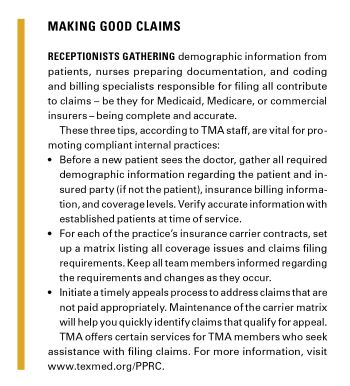
For those who see fraud, waste, and abuse in health care as a three-headed hydra to be vanquished, a newly enacted Texas law provides a key state agency with a new array of penalties, signaling the state’s focus on safeguarding Medicaid spending.
In the process, however, Senate Bill 1038 has elevated potential penalties for unknowingly violating Medicaid program rules to the same level as those for intentional fraud.
Passed during 2025’s regular legislative session and in effect as of Sept. 1, SB 1038 impacts enforcement of fraud and other Medicaid program rule violations by the Texas Health and Human Services Commission Office of Inspector General (OIG). Texas physicians should be aware of the new statute, as violations that previously carried a penalty up to $500 can now be penalized up to 20 times that amount.
Under OIG’s penalty statute, to qualify as a fraud allegation, health care professionals (and entities like hospitals) must know that a claim is false (or act with reckless disregard or conscious indifference to the truth or falsity of the claim). Prior to Sept. 1, fraudulent violations of Medicaid program rules were punishable by an administrative penalty of up to $10,000 per claim not resulting in injury, and anywhere from $5,000 to $15,000 if resulting in injury to a minor, an elderly person, or a person with a disability.
Claims not rising to the level of fraud, including unknowingly violating program rules, carried an administrative penalty of up to $500 per violation.
SB 1038 changed that, making those unknowing violations subject to the same up-to-$10,000 per violation administrative penalty as intentional fraud, plus recovery of up to three times the amount paid. Texas Medical Association advocacy, though, was able to help prevent a corresponding increase for documentation errors. As with violations of program rules, the introduced bill would have increased from $500 to $10,000 the maximum penalty for failure to maintain required documentation. Following a meeting with OIG personnel where association staff raised concerns about the increased penalties, subsequent versions of the bill restored the existing $500 maximum penalty for documentation errors (or the amount paid).
The legislation also extends the time for requesting a hearing to contest an alleged violation from 10 to 30 days – a change TMA specifically requested via its advocacy during the session.
Cynthia Peacock, MD, chair of TMA’s Committee on Medicaid, CHIP, and the Uninsured, indicates that the new law may add to physician burden for those trying to abide by Medicaid regulations.
“[Physicians are] going to have to read the fine print,” Dr. Peacock said. “To do Medicaid work, it’s a lot. It’s onerous for [physician practices] out there, especially those that don’t have the administrative support. There are just too many rules and regulations. [The state is] not making it easier for physicians.”
William Brendle Glomb, MD, vice chair of TMA’s Medicaid committee and chief medical officer with Waco Family Medicine, worries about the impact SB 1038 could have on federally qualified health centers (FQHCs) like his, reliant on a relatively small billing team with only one certified coder. Greater than 35% of the clinic’s 300,000 completed visits in the last year were for Texas Medicaid patients and their clinics serve around 75,000 unique patients, many of them without any funding.
“In many areas of the state, most rural areas in the state, certainly, we’re the only game in town for a lot of state-funded patients,” Dr. Glomb said. “The flip side of that is ... Medicaid ... keeps us viable and able to keep the lights on ... so we’re dependent on that, but [patients] are dependent on us too. And if anything chills that relationship ... it’s risking the whole system that FQHCs were originally designed for, and that’s to take care of the underserved.”
Increasing potential liability for violating program rules is concerning, as OIG rules list more than 100 distinct grounds for enforcement, incorporating various state and federal statutes and rules, Medicaid policies, and contractual provisions. The current version of the Texas Medicaid Provider Procedures Manual, detailing the state’s Medicaid guidelines, is an 1,800-page PDF.
Despite TMA’s continued concerns about increased liability for physicians, OIG spokesperson Jeremy Fuchs says the agency’s approach to combating fraud remains consistent.
“OIG’s priority is and always has been protecting taxpayer dollars and the people who receive services,” he told Texas Medicine. “Nothing in SB 1038 will change OIG’s approach to the provider cases it investigates or how they’re investigated. OIG receives a wide variety of referrals ranging from allegations of fraudulent conduct to allegations that Medicaid payments were mistakenly paid to providers. When a referral is received, the OIG considers the totality of the circumstances and determines which enforcement tool is appropriate.”
TMA acknowledged OIG’s role in testimony it submitted on SB 1038 to the Senate Committee on Health and Human Services, while warning of the bill’s potential negative impact on physicians.
Association staff also met with OIG personnel and representatives for other stakeholders – including dentists, hospitals, and FQHCs – while legislators were considering the bill, to better understand how the agency might implement it.
“OIG’s recovery should be proportionate to the severity of the violation, particularly when the errors OIG identifies are not the result of intentional fraud,” TMA wrote, adding that in 2014, the Texas Sunset Advisory Commission reviewed the OIG’s recovery efforts, finding them disproportionate to the violations committed.
The Texas Legislature responded the following year by passing Senate Bill 207, which revised some aspects of investigating Medicaid fraud or abuse, including procedures for recouping overpayments and debts, and an amended definition of fraud specifying that it “does not include unintentional technical, clerical, or administrative errors.”
Mr. Fuchs says the 2014 sunset review illuminated relevant, legitimate concerns the agency took seriously.
“The OIG’s practices have changed considerably over the last decade in response to that review,” he said. “OIG has taken steps to ensure recoupments and penalties are balanced with the severity of the violation and consistent across cases and providers.”
Drs. Peacock and Glomb anticipate their Committee on Medicaid, CHIP, and the Uninsured will be monitoring the new law’s impact and enforcement.
“If [state legislators] would just come and spend a day with us, we’ll show them what goes on, how we’re just operating on a shoestring budget for the most part, and that nobody’s out to cheat anybody,” Dr. Glomb said. “We simply want to get reimbursed for the services we deliver and to have the best outcomes for the state’s and our patients.”
Dr. Peacock is similarly concerned with SB 1038’s range of penalties and emphasizes Medicaid has a built-in incentive for physicians to be accurate: Those who don’t fill out paperwork correctly don’t get paid.
Sheila Magoon, MD, also a member of TMA’s Medicaid committee, was preparing to double down on diligence as the law went into effect. She is executive director of South Texas Physician Alliance, a Harlingen-based physician network with a sizable Medicaid population.
“It’s just making sure you’re billing correctly based on the rules,” she said. “Review your processes, review your compliance training, remind everyone [in your practice] that they are just as important and responsible for making sure this compliance occurs.”

Dr. Magoon sees the extended time to request a hearing as a positive.
“The 30 days gives you time to review the violation, and then if you need [legal] counsel, to be able to get counsel to review and to help,” she said. “At this point, we’re going to have to have a higher level of awareness until we understand how this is going to be actually implemented.”
OIG emphasizes physicians should be cognizant of any new rule changes implemented by Medicaid and follow those rules, just as they should for Medicare and commercial insurers.
“It remains crucial for providers to know and follow the rules that they agreed to when enrolling in the Medicaid program,” Mr. Fuchs said.
He recommended reaching out to the Texas Medicaid & Healthcare Partnership with questions; that entity, along with the Texas Health and Human Services Commission Medicaid and Children’s Health Insurance Program Services, provide resources helping physicians “navigate those rules and remain in compliance.”
Dr. Magoon observes that physicians do indeed want to remain in compliance.
“We want to do what’s right, and we want to do what’s best for our patients and follow the rules. Sometimes we just need help in understanding the requirements.”

Phil West
Associate Editor
(512) 370-1394
phil.west[at]texmed[dot]org

Phil West is a writer and editor whose publications include the Los Angeles Times, Seattle Times, Austin American-Statesman, and San Antonio Express-News. He earned a BA in journalism from the University of Washington and an MFA from the University of Texas at Austin’s James A. Michener Center for Writers. He lives in Austin with his wife, children, and a trio of free-spirited dogs.